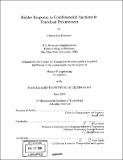Bidder response to combinatorial auctions in truckload procurement
Author(s)
Plummer Clinton Lee, 1980-
DownloadFull printable version (9.650Mb)
Other Contributors
Massachusetts Institute of Technology. Engineering Systems Division.
Advisor
Yosef Sheffi.
Terms of use
Metadata
Show full item recordAbstract
This thesis explores how truckload carriers use conditional bids within the framework of a combinatorial auction to win more business and balance their existing networks. Because a considerable portion of a truckload carrier's cost of serving a given lane is associated with the probability of finding a follow-on load (i.e. economies of scope), bidding on a lane-by-lane basis may not accurately reflect a carrier's true cost of serving that lane. In a combinatorial auction, a truckload carrier can more accurately reflect its true cost of serving a given lane by offering package discounts, conditional on winning lanes that increase the probability of finding follow-on loads. Though a considerable amount has been written about the economics of truckload carrier's operations and the benefits of combinatorial auctions to shippers, few have studied conditional bidding from a bidder's (carrier's) perspective. This thesis makes three contributions. First, an explanation of why bidders do and don't submit conditional bids in combinatorial auctions is provided. Second, a model of carrier costs functions, including package discounts (a measure of economies of scope) is developed. Finally, this thesis examines regional pricing differences, and quantifies the amount by which carriers will change their prices in different regions of the US.
Description
Thesis (M. Eng. in Logistics)--Massachusetts Institute of Technology, Engineering Systems Division, 2003. "June 2003." Includes bibliographical references (p. 62-63).
Date issued
2003Department
Massachusetts Institute of Technology. Engineering Systems DivisionPublisher
Massachusetts Institute of Technology
Keywords
Engineering Systems Division.